Advocacy

The MMBA is your voice in the mortgage industry
Each year our Lobbyist, our Legislative Committee and Board review all bills filed. We then figure out our position, prioritize and then get to work! We will meet with our federal and state legislators, attend hearings and provide written testimony. Read about our recent advocacy efforts on behalf of MMBA members below.
Click here to search for current bills Click here to identify your legislatorIf you would like to serve on our Legislative Committee, please contact Debbie Sousa at dsousa@massmba.com
2025 Beacon Hill Day - MMBA Members Making a Difference!
June 16, 2025
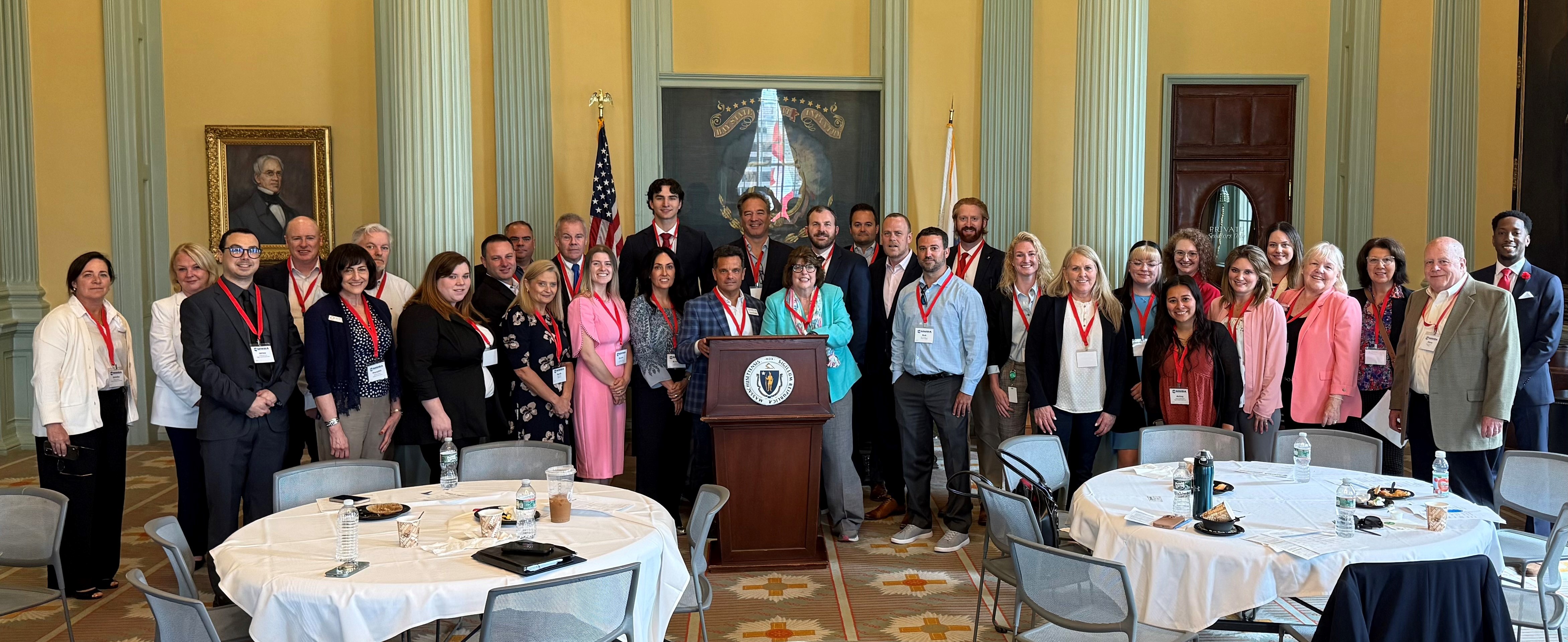
Thank you to Meagan Butler (DCU), Darryl Caffee (Webster Five), Liam Cahill (Cape Cod 5), Taylor Campbell (DCU), Lou Chinappi (Arch MI), Kristen Davis (Essent Guaranty), John Doyle (Hanscom Federal Credit Union), James Driscoll (Mortgage Equity Partners), James Driscoll III (student), Tucker Dulong (CATIC), Ryan Footit (HMA Mortgage), Michele Hart (Hanscom Federal Credit Union), E. Scott Hiser (DCU), Nina Hovsepian (DCU), Brittany Howe-Deutsch (DCU), Andy Hutchings (DCU), Jennifer Jackson (Hanscom Federal Credit Union), Michael Kelleher (Adopt the Brand), Tim Kickham (Homwtown Financial), Shylah Luna (Barton Gilman LLP), Jimmy Macaruso (DCU), Jared Maxwell (Embrace Home Loans), Donna Miller (MMBA), Lisa Miscia (DCU), Emma Ouellette (DCU), Bob Petrelli, Jr. (HMA Mortgage), Cheryl Rogers (DCU), Sarah Ruder (Cape Cod 5), Richard Scherer (New Fed Mortgage Corp), Ashley Solares-Depaz (DCU), Steve Sousa (MBREA), Debbie Sousa (MMBA), Meredith Spence (Embrace Home Loans), Rayanne Toomey (DCU) and Stephanie White (DCU). A big thank you to Andrea Costa, James Eisenberg and Richard Tisei at PretiSTRATEGIES!
Click here for our Beacon Hill Day handout!
MMBA Members in Washington DC Advocating for Important Issues!
April 8-9, 2025
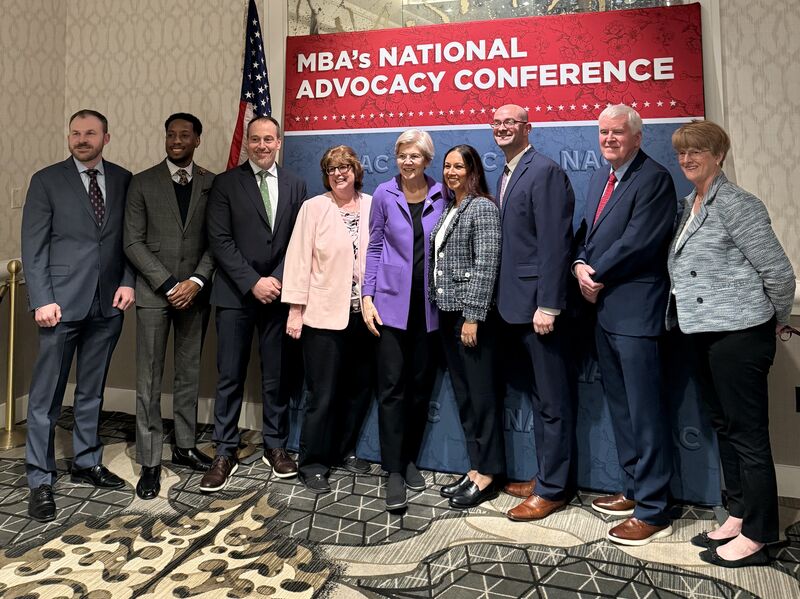 Thank you to (L to R) Michael Kelleher (Easy Mortgage Apps), Darryl Caffee (Webster Five), Sean Fleming (Washington Trust), Debbie Sousa (MMBA), Senator Elizabeth Warren, Alisa Pater (Grandbridge Real Estate Capital), Gregory Halloran (CBRE Capital Markets), Dan Briand (BayCoast Mortgage), Jennifer Cowles (FHLB Boston) and Nicholas Christ (not pictured -BayCoast Mortgage) for bringing your voices in Massachusetts to Capitol Hill!
Thank you to (L to R) Michael Kelleher (Easy Mortgage Apps), Darryl Caffee (Webster Five), Sean Fleming (Washington Trust), Debbie Sousa (MMBA), Senator Elizabeth Warren, Alisa Pater (Grandbridge Real Estate Capital), Gregory Halloran (CBRE Capital Markets), Dan Briand (BayCoast Mortgage), Jennifer Cowles (FHLB Boston) and Nicholas Christ (not pictured -BayCoast Mortgage) for bringing your voices in Massachusetts to Capitol Hill!
Click Here for MMBA Talking Points
Click here for MMBA Video from the Capital
Click here for Senator Warren's Address
Click here for HUD Secretary Scott Turner remarks
You made a difference! #MBANAC25

February 9, 2025
MMBA members have spent significant time and valuable resources proving the safety and soundness of the mortgage market in Massachusetts. Our members create consumer friendly disclosures, offer applicants visibility into their application and pricing, and make sure when the loan closes we serve that homeowner over the 30 years (or less) they are in the home.
Whether or not the CFPB exists tomorrow or someday in the future, we will continue to provide any lender operating in Massachusetts that joins MMBA the tools and resources to make the most qualified loans with transparency and disclosure of everything a homebuyer or homeowner needs to make the right decision for their situation.
And in times of uncertainty when our members ask “what does this mean for me?” We respond. Please reach out to MMBA and let us know what programs and answers you need. We are here for you.
Remote Counseling for Reverse Mortgages is now allowed in Massachusetts!
May 1, 2024
Yesterday afternoon (April 30th), Governor Maura Healey signed H.4582 Into law as Chapter 88 of the Acts of 2024. Chapter 88 includes the provisions to authorize reverse mortgage counseling via synchronous real-time video conference or telephone on a permanent basis. These provisions are effective as of 3/31/24. Click here for the MMBA announcement.Ask your federal legislators to support S.3502 and H.R.4198 to eliminate mortgage trigger lead abuses!
December 18, 2023
|
Remote Online Notarization (RON) Enacted in Massachusetts!
March 31, 2023
Govenor Healey signed Chapter 2 of the Acts of 2023 into law. Although this was an appropriations bill, RON language is contained within Sections 22-29 (pages 15-27). For the past four years, the MMBA along with other industry stakeholders have been working together on model language for RON. Much of this language was adopted by legislators. More details will follow but here are some key facts:
- The language contained withing this Act meets national model standards for RON.
- Although the effective date if within 90 days of the enactment, the Secretary has until January 1, 2024 to implement regulations.
Contained within the language is the codification of the REBA vs. NREIS court decision regarding the unauthorized practice of law. What this means is that only an attorney who is licensed to practice law (or a non-attorney under the direct supervision of the attorney) may conduct real estate closings. Stand-alone home equity lines and loans are excluded from this requirement if:
- secured by a 1-4 family dwelling
- does not involve the issuance of title insurance in connection with the transaction
- is retained by the lender and not sold on the secondary market.
MA Division of Banks Updates Regulatory Bulletin 1.3-104
November 28, 2022
This revised bulletin was a result of several communications between the MMBA, Massachusetts Bankers Association, the Cooperative Credit Union Association and the Division. An inverted yield curve, rapidly rising interest rates, and the status of 1-year Treasury-indexed ARM's as no longer saleable to Fannie Mae and Freddie Mac caused many adjustable rate mortgages to meet the "subprime mortgage loan" definition in Regulatory Bulletin 1.3-104. The MMBA first notified the Division on October 17th, followed by a joint industry letter on October 21st. The Associations provided the Division with joint feedback after meeting with the Division. Regulatory Bulletin 1.3-104 was revised on November 23rd. Click here for the MMBA recap emails on November 21st and November 28th.
Click here for the 2012 version of RB 1.3-104 Click here for a recording of the December 8th webinarLegislative Priorities Before the Formal Session Ends
June 30, 2022
The MMBA is asking members to contact their legislators to act on 5 specific issues prior to the end of the formal session on July 21st. The five legislative talking points are 1) Expedite H.1146 to allow video or telephone conferencing to satisfy the in-person requirement for reverse mortgage counseling 2) Expedite H.4716 for the passage of Remote Online Notarization (RON) 3) Oppose S.868 and other bills establighing real estate transfer taxes and use other solutions to increase funding for affordable housing 4) Oppose H.1035 as current mortgage interest rates cannot be printed on monthly mortgage statements 5) Oppose H.1426/S.890 to guarantee tenant's first right of refusal. The MMBA has compiled a legislative handout discussing each of these five issues. Click here to contact your legislators through the Mortgage Action Alliance. Click here for a cut and paste wording for your email.
Click here for Reverse Mortgage Letter sent to leadership
MMBA Joins Industry Stakeholders on RON in Massachusetts
April 8, 2022
For the past three years, MMBA has been part of an industry stakeholder's coalition working on comprehensive Remote Online Notarization (RON) language. This suggested language ensures Massachusetts’ notaries will have access to the most secure and latest notarization technology, while at the same time strengthening consumer protections and clarifying the rules governing the unauthorized practice of law. On April 8th the coalition sent a joint letter to Speaker Mariano and President Spilka supporting the passage of RON legislation. The MMBA has provided written and verbal testimony over the past few years supporting RON at the federal and state level.
Take Action to Stop the Sales Tax on Real Estate!
March 10, 2022
State lawmakers are considering allowing cities and towns to impose a new tax the sale and transfer of homes and commercial property. This new law is applied unequally and will raise the cost of homeownership and real estate by thousands of dollars.
None of these bills have consistency regarding language or exemptions which is extremely problematic. Imagine the confusion for a consumer trying to purchase a home -not only are they trying to navigate important factors such as neighborhood amenities and school systems -now consumers would have to keep track of what individual cities and towns might require for transfer taxes.
From a lending and compliance perspective, items such as transfer tax estimates must be 100% correct with zero tolerance for error. Imagine having to ensure 100% acuracy when closing costs may differ from one bordering city to the next. These bills allow municipalities to create their own individual standards of exemptions, transfer amounts and who is responsible for payment -the buyer and/or the seller. This is a compliance nightmare for lenders and overwhelming for consumers. Take action now through the Mortgage Action Alliance and tell your state lawmakers to oppose a new sales tax on real estate! Click here for MMBA Statement on Transfer Tax Legislation
Take Action and tell Congress to Urge Treasury and FHFA to allow Flexibility in GSE Purchase Caps
April 20, 2021
On January 14, 2021 the Treasury and FHFA executed a document amending the Preferred Stock Purchase Agreement (PSPA). This agreement significantly reduces Fannie Mae and Freddie Mac's secondary market presence. The amended PSPA imposed caps on loans exhibiting "higher risk" characteristics - mortgages with 2 or more of the following features: credit scores below 680, combined loan-to-value ratios above 90%, or debt-to-income ratios above 45%. With the new caps, the GSE's are limited to a maximum portfolio exposure of 6% on purchases and 3% on refinances of such "higher risk" loans. Limiting "higher risk" loans will have a disproportionate impact on low-to-moderate income borrowers and communities. This may impact Fair Lending. The PSPA amendment also limits their purchase of second homes and investment properties to no more than 7% of their combined loans. The higher cost of financing because of additional pricing adjustments for riskier loans will result in a higher the cost for renters, many of whom are LMI consumers. The MMBA has sent letters to Treasury Secretary Janet Yellen, FHFA Director Mark Calabria, CFPB Acting Director Dave Uejio, Senator Elizabeth Warren and Senator Edward Markey. We need you to Take Action through the Mortgage Action Alliance and tell Congress to Urge Treasury and FHFA to allow flexability in GSE Purchase Caps
Take Action to Veto Section 83 (Right of First Refusal) of H. 5250, An Act Enabling Partnerships for Growth.
January 11, 2021
Take Action to Veto Section 83 (Right of First Refusal) of H. 5250, An Act Enabling Partnerships for Growth. This legislation requires owners to notify tenants about intent to sell, short-sales and deeds in lieu of foreclosure procedures. Any municipality may adopt these provisions. The bill outlines a series of confusing back-and-forth communication requirements adding nine months to the purchase, short-sale and foreclosure process, which could create a hardship for consumers. The language in this bill provides tenant associations (not tenants) with the contractual opportunity to purchase rental properties. In other states and districts where this has been imposed such as California and Washington, DC, the results have been problematic. Tenants can assign their rights to developers; they can deliberately hold up a sale in order to get more money from sellers, and homeowners will continue to incur debt until a home is sold. The MMBA believes that we can learn from the mistakes of other states. Call Governor Baker at 617.725.4005 or click here to email the Governor and ask him to Veto Section 83. Read our letter to Governor Baker.
Take Action to Oppose H.5018, An Act to Guarantee Housing Stability During The COVID-19 Emergency and Recovery
October 13, 2020
Take action to oppose H.5018, An Act to Guarantee Housing Stability During The COVID-19 Emergency and Recovery, which seeks to extend current forberance provisions and extends foreclosure moratorium for 12 months after the state of emergency. This legislation will have severe, adverse impacts on lenders by extending recovery options to borrowers and placing the burden on the industry. Contact your Representative today and tell him/her you oppose H.5018 and agree with the MMBA position statement.
Click here for MMBA position statement
Urge the FHFA and the GSEs to Withdraw Adverse Market Refinance Fee
August 13, 2020
Contact your senators and representative today and urge them to ask the FHFA and the GSEs to withdraw the new Adverse Market Refinance Fee. This fee undermines both Federal Reserve policy to keep rates low, and the administration's recently announced directives to support struggling homeowners. Take action in 30 seconds by filling out this form.
Take Action to Oppose HD.5166 and S.2831, An Act to Guarantee Housing Stability During The COVID-19 Emergency and Recovery
July 22, 2020
Take action to oppose HD.5166 and S.2831, An Act to Guarantee Housing Stability During The COVID-19 Emergency and Recovery,which seeks to extend current eviction and foreclosure moratoriums as well as mandatory forbearances for 12 months after the state of emergency. This legislation will have severe, adverse impacts on lenders by extending recovery options to borrowers and placing the burden on the industry. Contact your legislators today https://www.votervoice.net/MBA/Campaigns/75990/Respond.
MMBA Urges FHFA, Fannie Mae and Freddie Mac to Make Changes to Support Homeowners and Lenders During COVID-19
April 2020
As we get further along in the COVID-19 pandemic, we need to have our voices heard regarding three important issues: interior appraisal inspection relief, failure to purchase closed loans and additional liquidity. We face a lack of support from the FHFA, Fannie Mae and Freddie Mac. We sent letters to all Massachusetts federal Senators, Representatives, the FHFA and the media on April 9. We need you to get involved as well! The mission of Fannie Mae and Freddie Mac should be more than just words on their website. They need to take responsibility and help consumers, mortgage lenders and servicers NOW. Find out how you can help.
2021 -The MMBA Makes a Difference on Capitol Hill
.jpg)
Seven members of the MMBA traveled to Washington, DC on April 26-27 and participated in the MBA National Advocacy Conference. We met with Massachusetts legislators and senior policy advisers to discuss important federal issues, including:
- Affordable Housing
- Appraisal Bias
- Regulatory Clarity
- Remote Online Notarization (RON)
- Tax Reform
MMBA Provides Verbal and Written Testimony to Joint Committee on Housing

The MMBA attended an 8-hour hearing at the statehouse on January 14. Over 800 consumers and housing advocates testified for tenant rights, rent control and transfer taxes. The MMBA submitted written testimony on 12 bills and in our allotted three minutes provided verbal testimony on the issue of transfer taxes.
Read the MMBA’s written testimony and position on 12 different bills
Read the MMBA’s verbal testimony on transfer taxes
Talking Points for An Act to Promote Housing Choices and Transfer Tax Fee Legislation
MMBA Submits Commentary to CFPB About TRID

As required by Dodd-Frank, the CFPB was required to ask the industry for its response to TRID and how well the disclosures are meeting or falling short of enhancing the consumer's understanding of their loan and closing terms. The deadline for commentary was January 21st. The MMBA submitted commentary based upon your feedback.
MMBA Advocacy Initiative – Disparate Impact

The MMBA submitted testimony to HUD in late October that provided feedback in response to HUD’s Notice of Proposed Rulemaking FR-6111-P-02 “Implementation of the Fair Housing Act’s Disparate Impact Standard” (the Proposed Rule). The MMBA noted it supports HUD’s revisions to the burden of proof necessary to prove a prima facie case of disparate impact to conform its rules to the Supreme Court’s decision in Texas Department of Housing and Community Affairs v. Inclusive Communities Project, Inc. (“Inclusive Communities”). The MMBA’s testimony urged HUD to finalize the Proposed Rule’s changes to the burden of proof for a claim in light of the standards articulated by the Supreme Court in Inclusive Communities.
MMBA Advocacy – Data Privacy and Security
.png)
MMBA’s Executive Director Debbie Sousa submitted testimony and attended the October 7 hearing on S.B. 120 An Act Relative to Consumer Data Privacy. On behalf of the MMBA’s members, Debbie asked the committee to send the bill into study for the following reasons:
- Data privacy and security is a national issue and there are several federal laws governing data security in the financial industry. The Federal Trade Commission (FTC) will be amending data security rules for financial institutions to better protect consumers and the additional time would provide the opportunity to review the amendments to ensure there are no conflicts between federal and state regulations.
- Each state has different regulations and laws governing data privacy and security and this makes it extremely difficult for a business to be compliant. California has taken the lead in passage of the California Consumer Privacy Act (CCPA) but follow-up amendments were needed for clarification. In addition, the Attorney General has not yet published regulations. The additional time will allow us to understand why the amendments were needed to clarify the original language in the CCPA and perhaps make changes in SB.120, as well as other data privacy and security bills before this committee, so there is more conformity between state laws and regulations governing this important issue.
The MMBA’s testimony also suggested clarifying the definition of “personal information” in the bill to match the amendments to the CCPA, which define personal information as data that is “reasonably capable of being associated with a consumer.”
MMBA Submits Comments to CFPB on the Qualified Mortgage Definition

Following the Consumer Financial Protection Bureau’s advanced notice of proposed rulemaking, the MMBA submitted a letter to the agency voicing its concerns about the impact of amending the Qualified Mortgage (“QM”) definition under the Truth in Lending Act (“TILA”) and the Ability to Repay (“ATR”) rule.
The MMBA’s comments highlighted the potential adverse impact of ending the temporary Government Sponsored Entity (“GSE”) qualified mortgage (“QM”) exemption due to expire on January 10, 2021 (the “GSE Patch”) and replacing it with a “General QM.” In its letter, the MMBA outlined the two issues of greatest concern to its members: (1) reverting to a debt-to-income ratio of 43% for general QM loans and (2) using Appendix Q’s rigid underwriting rules, originally released with the ATR/QM Rule, as the sole underwriting standard. The MMBA urged the CFPB to modify the ATR/QM by removing the arbitrary limits on the debt to income ratio and permitting the use of flexible, yet prudent underwriting standards to expand access to credit for self-employed, non-traditional and underserved credit applicants.
For more details, and to read the full text of the MMBA’s letter to the CFPB, click here.
MMBA Members Testify in Support of Electronic Notarization Legislation Before the Joint Committee on the Judiciary
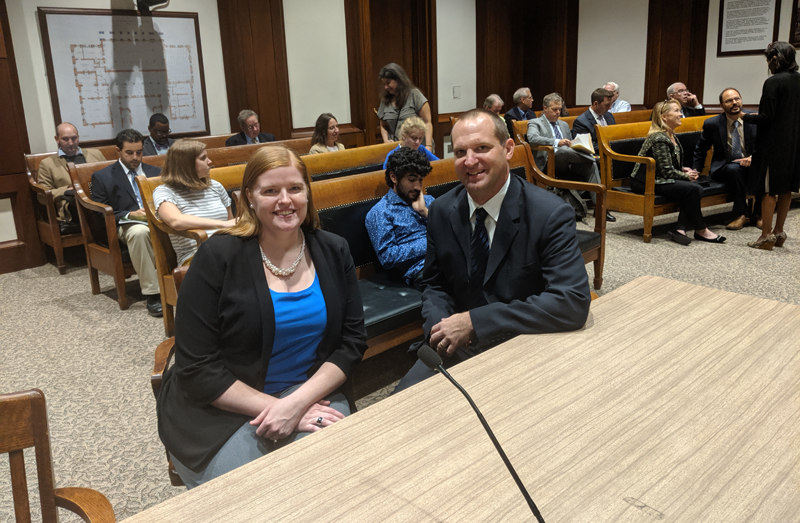
MMBA Executive Director Debbie Sousa and MMBA members Sarah Blake and Caleb Cook from Digital Federal Credit Union testified at the September 17, 2019 hearing before the Joint Committee on the Judiciary in support of House Bill 3293, which would allow for in-person notarization. As part of the MMBA’s advocacy initiative, Debbie also provided written testimony for four notary bills.
In-person electronic notarization allows notarial acts electronically without the use of paper, however, the parties are still required to be physically present. Electronic notarization is a key component to achieve widespread adoption of end-to-end digital real estate transactions, an expectation that many buyers and sellers expect in the digital age – and which a number of other states have already implemented.
The MMBA Makes a Difference on Beacon Hill
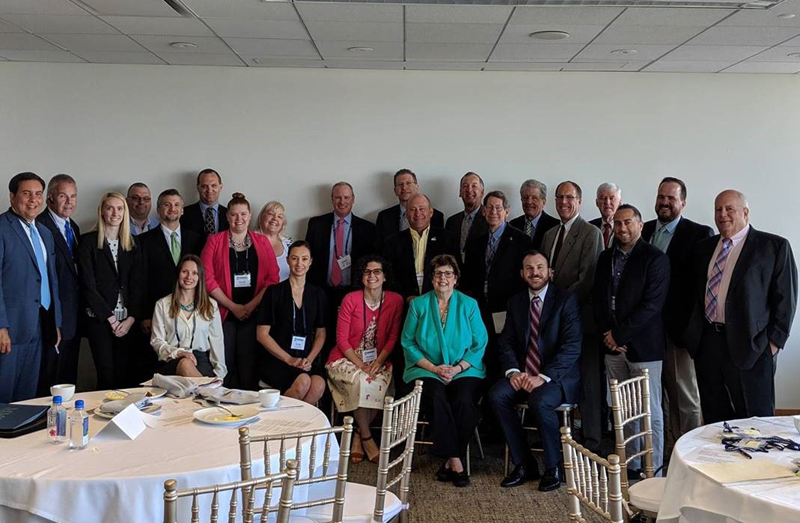
On June 12th, 24 members of the MMBA participated in the 2019 Beacon Hill Day and met with 34 State Senators, Representatives and senior staff. We discussed important legislative topics, including supporting the Act to Promote Housing Choices and the passage of An Act Regulating Appraisal Management Companies. Members also recommended implementing in-person electronic notarization. We urged our state representatives to oppose a number of bills that increase taxes on home sales to fund climate change and Community Preservation Trust initiatives. Members voiced their opposition to mandatory energy audits and scoring and provided alternative suggestions to achieve these goals while protecting consumers. MMBA members also discussed their reasons for opposing legislation that mandates judicial review, mandatory mediation and moratoriums on foreclosures. Learn more about these issues and the MMBA’s position.
The MMBA is currently tracking 150 bills that would impact the mortgage industry. It is vital that your legislators understand the impact of these bills – and they need to hear from you. Contact us to find out how you can help.
Massachusetts Mortgage Bankers Association Submits Amicus Brief in Thompson v. JPMorgan Chase Bank, N.A.

We are very pleased to announce that the Massachusetts Mortgage Bankers Association has submitted an Amicus Brief (“Amicus”) in the case of Thompson v. JPMorgan Chase Bank, N.A. in support of Chase, the Defendant/Appellee. We took this action in response to this enormously consequential decision issued on February 8, 2019 by the U.S. Court of Appeals. This case has the clear potential to create uncertainty and hardship for mortgage lenders in the Commonwealth by calling into question the validity of countless pending and previously completed foreclosures. In filing their Amicus, the MMBA joined a host of concerned organizations including Fannie Mae, the Mortgage Bankers’ Association, the MA Real Estate Bar Association and the MA Bankers Association.
The MMBA Makes a Difference on Capitol Hill
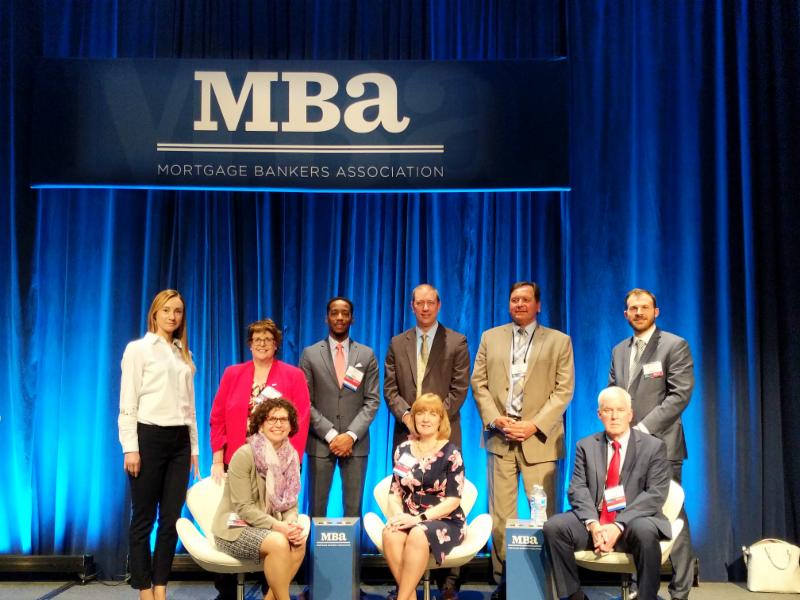
Nine members of the MMBA traveled to Washington, DC in March and met with Massachusetts legislators and senior policy advisers to discuss important federal issues, including:
- Regulatory clarity including issuing clear guidance, holistic fixes to the Qualified Mortgage rule, TRID and HMDA
- Self-Employed Mortgage Access Act (S.540)
- GSE reform
- Government lending program support
- Affordable housing
- Restoring FHLB membership status
- Student loan legislation
2017 - MMBA Meets with Federal Legislators
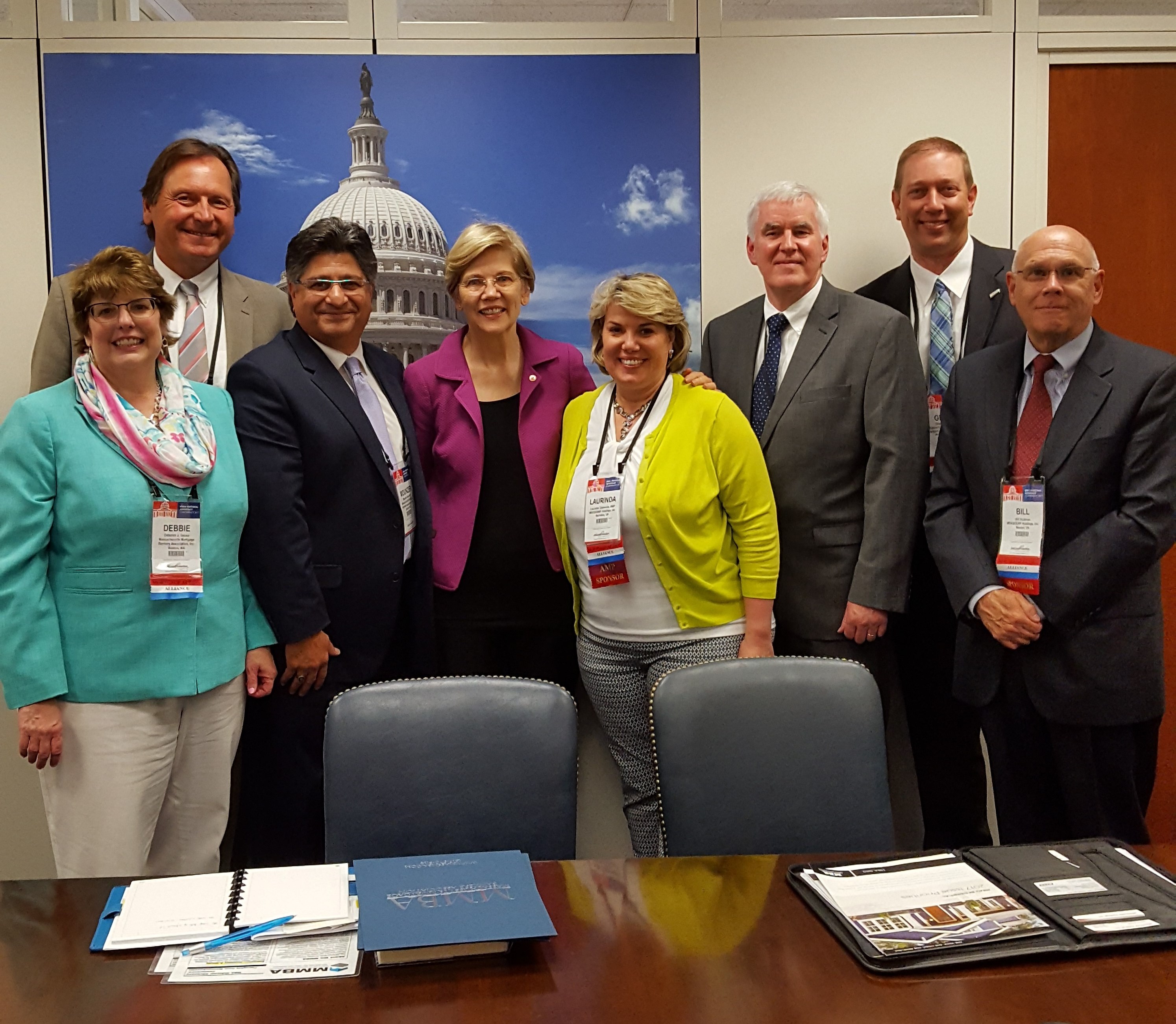
On June 21st, a group of Massachusetts constituents met with Senator Elizabeth Warren, Congressman Seth Moulton, Congressman Mike Capuano and Congressman Bill Keating to discuss current regulatory and legislative issues impacting the mortgage industry. We also met with Senior Policy Staff from Senator Markey's office along with Congressmen Clark, Kennedy and Lynch. Topics discussed included Regulatory Certainty and Clarity; Financial CHOICE Act components such as expansion of Appendix Q; GSE Reform; Government Lending Program support; PACE legislation; National Flood Insurance Re-authorization, G-FEE Non-Housing Prohibition and Student Loan legislation.
Click here for the MMBA Talking Points handout.

